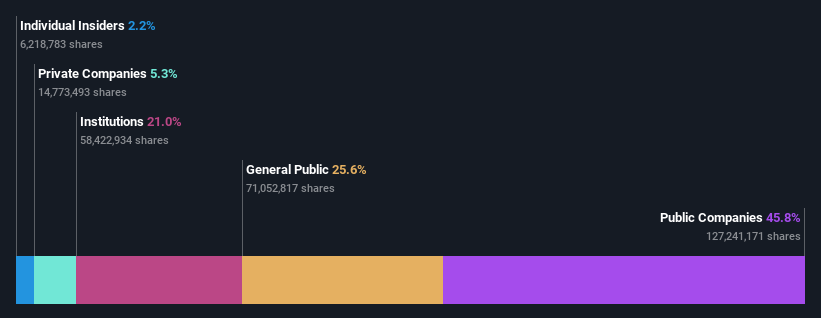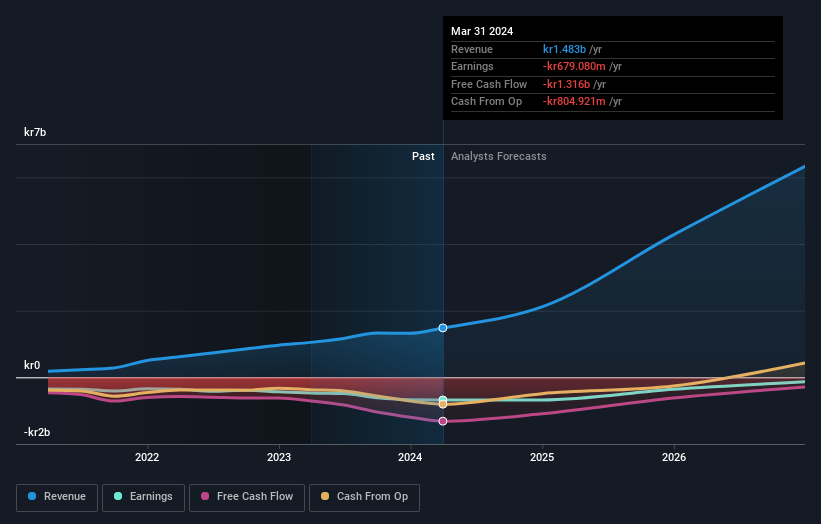Stock Analysis
Hexagon Purus ASA's (OB:HPUR) largest shareholders are public companies who were rewarded as market cap surged kr369m last week

Key Insights
- Significant control over Hexagon Purus by public companies implies that the general public has more power to influence management and governance-related decisions
- 51% of the business is held by the top 4 shareholders
- Institutional ownership in Hexagon Purus is 21%
A look at the shareholders of Hexagon Purus ASA (OB:HPUR) can tell us which group is most powerful. With 46% stake, public companies possess the maximum shares in the company. That is, the group stands to benefit the most if the stock rises (or lose the most if there is a downturn).
As a result, public companies collectively scored the highest last week as the company hit kr1.9b market cap following a 25% gain in the stock.
Let's delve deeper into each type of owner of Hexagon Purus, beginning with the chart below.
Check out our latest analysis for Hexagon Purus

What Does The Institutional Ownership Tell Us About Hexagon Purus?
Institutions typically measure themselves against a benchmark when reporting to their own investors, so they often become more enthusiastic about a stock once it's included in a major index. We would expect most companies to have some institutions on the register, especially if they are growing.
As you can see, institutional investors have a fair amount of stake in Hexagon Purus. This can indicate that the company has a certain degree of credibility in the investment community. However, it is best to be wary of relying on the supposed validation that comes with institutional investors. They too, get it wrong sometimes. If multiple institutions change their view on a stock at the same time, you could see the share price drop fast. It's therefore worth looking at Hexagon Purus' earnings history below. Of course, the future is what really matters.

Hexagon Purus is not owned by hedge funds. The company's largest shareholder is Hexagon Composites ASA, with ownership of 38%. With 7.5% and 2.7% of the shares outstanding respectively, Mitsui & Co., Ltd. and MP Pensjon PK are the second and third largest shareholders.
On looking further, we found that 51% of the shares are owned by the top 4 shareholders. In other words, these shareholders have a meaningful say in the decisions of the company.
Researching institutional ownership is a good way to gauge and filter a stock's expected performance. The same can be achieved by studying analyst sentiments. There are a reasonable number of analysts covering the stock, so it might be useful to find out their aggregate view on the future.
Insider Ownership Of Hexagon Purus
The definition of company insiders can be subjective and does vary between jurisdictions. Our data reflects individual insiders, capturing board members at the very least. Management ultimately answers to the board. However, it is not uncommon for managers to be executive board members, especially if they are a founder or the CEO.
Most consider insider ownership a positive because it can indicate the board is well aligned with other shareholders. However, on some occasions too much power is concentrated within this group.
We can report that insiders do own shares in Hexagon Purus ASA. It has a market capitalization of just kr1.9b, and insiders have kr41m worth of shares, in their own names. Some would say this shows alignment of interests between shareholders and the board, though we generally prefer to see bigger insider holdings. But it might be worth checking if those insiders have been selling.
General Public Ownership
The general public-- including retail investors -- own 26% stake in the company, and hence can't easily be ignored. While this group can't necessarily call the shots, it can certainly have a real influence on how the company is run.
Private Company Ownership
Our data indicates that Private Companies hold 5.3%, of the company's shares. Private companies may be related parties. Sometimes insiders have an interest in a public company through a holding in a private company, rather than in their own capacity as an individual. While it's hard to draw any broad stroke conclusions, it is worth noting as an area for further research.
Public Company Ownership
It appears to us that public companies own 46% of Hexagon Purus. It's hard to say for sure but this suggests they have entwined business interests. This might be a strategic stake, so it's worth watching this space for changes in ownership.
Next Steps:
I find it very interesting to look at who exactly owns a company. But to truly gain insight, we need to consider other information, too. Consider for instance, the ever-present spectre of investment risk. We've identified 2 warning signs with Hexagon Purus , and understanding them should be part of your investment process.
But ultimately it is the future, not the past, that will determine how well the owners of this business will do. Therefore we think it advisable to take a look at this free report showing whether analysts are predicting a brighter future.
NB: Figures in this article are calculated using data from the last twelve months, which refer to the 12-month period ending on the last date of the month the financial statement is dated. This may not be consistent with full year annual report figures.
Valuation is complex, but we're helping make it simple.
Find out whether Hexagon Purus is potentially over or undervalued by checking out our comprehensive analysis, which includes fair value estimates, risks and warnings, dividends, insider transactions and financial health.
View the Free AnalysisHave feedback on this article? Concerned about the content? Get in touch with us directly. Alternatively, email editorial-team (at) simplywallst.com.
This article by Simply Wall St is general in nature. We provide commentary based on historical data and analyst forecasts only using an unbiased methodology and our articles are not intended to be financial advice. It does not constitute a recommendation to buy or sell any stock, and does not take account of your objectives, or your financial situation. We aim to bring you long-term focused analysis driven by fundamental data. Note that our analysis may not factor in the latest price-sensitive company announcements or qualitative material. Simply Wall St has no position in any stocks mentioned.
About OB:HPUR
Mediocre balance sheet with limited growth.


